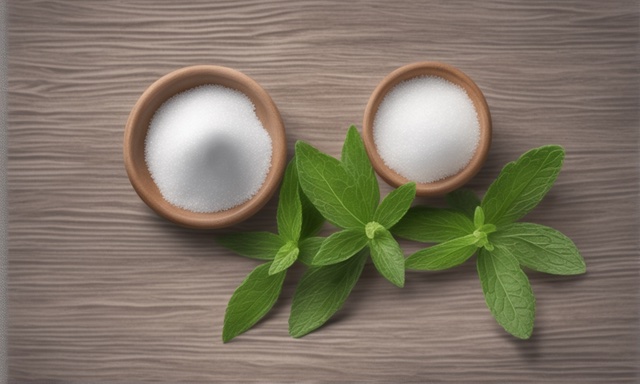Internet Asks: "Is Truvia Safe for Diabetics?"
For individuals with diabetes, managing blood sugar is paramount, and this often means re-evaluating sugar intake. Truvia, a sugar substitute, has emerged as a popular alternative to traditional sugar. But is it safe for those with diabetes? In this context, we delve into understanding the safety of Truvia for people diagnosed with diabetes.
sponsored links

What is Truvia?
Truvia is a commercial sweetener created from a blend of erythritol, stevia leaf extract, and natural flavors. These components are pivotal in understanding Truvia's compatibility with a diabetes-conscious diet.
-
- Erythritol: This sugar alcohol is naturally found in certain fruits and fermented foods. Erythritol is absorbed by the body but not metabolized, meaning it provides virtually no calories and has no effect on blood sugar, making it safe for diabetics. It’s generally well-tolerated, though excessive consumption might lead to digestive discomfort in some individuals.
-
- Stevia Leaf Extract: Derived from the leaves of the Stevia rebaudiana plant, stevia is a potent sweetener with negligible caloric content. Research suggests that stevia might exert a negligible effect on blood glucose levels, making it a viable option for diabetics.
-
- Natural Flavors: These are incorporated to enhance Truvia's taste. While ‘natural flavors’ is a broad term, the components in Truvia are deemed safe for general consumption.
Safety Profile: A Close Look
- - No Glycemic Impact: Truvia doesn't spike blood glucose levels due to its non-glycemic components, providing sweetness without the associated glycemic load of traditional sugar.
- - Calorie Content: Truvia is a low-calorie sweetener, making it a beneficial choice for individuals watching their calorie intake, which is crucial for weight management in diabetes.
- Adaptability in Diet: Whether you are baking, cooking, or simply sweetening your coffee, Truvia’s versatility allows for its inclusion in varied dietary plans without compromising blood sugar management.
- Tooth-Friendly: Truvia does not contribute to tooth decay, an important consideration as individuals with diabetes are often at higher risk for dental problems.
sponsored links
Considerations for Diabetics
While Truvia may seem like a safe option, it's essential to consider the following points:
-
- Moderation is Key: Even safe sweeteners should be used in moderation. Over-reliance on sweeteners can perpetuate a preference for sweet tastes, potentially leading to poor dietary choices.
-
- Individual Responses: People with diabetes should monitor their blood sugar levels regularly to understand how different sweeteners, including Truvia, affect their bodies, as individual responses may vary.
-
- Holistic Approach: Using Truvia or other sweeteners is not a substitute for a holistic approach to diabetes management, which includes a balanced diet, regular physical activity, and adherence to medication protocols as prescribed.
Conclusion: A Safe, Yet Considerate Choice
Truvia, with its blend of erythritol and stevia, emerges as a safe alternative to sugar for individuals managing diabetes. However, the emphasis on moderation and individualized consultation cannot be overstated. As part of a balanced, well-considered diet, Truvia can be a sweet addition to the diabetic pantry, allowing for enjoyment of sweetness without jeopardizing blood sugar control.
Disclaimer: This article is intended for informational purposes only and is not a substitute for professional medical advice, diagnosis, or treatment. Always consult with your physician or other qualified health providers with any questions you may have regarding a medical condition or dietary change.
sponsored links
References
1. Truvia About Truvia® Sweetness. https://www.truvia.com/why-truvia#:~:text=Three%20Ingredients.&text=Truvia%20Calorie%2Dfree%20Stevia%20Sweetener,and%20extract%20its%20natural%20sweetness
2. UCSF Medical Center Nutrition & Food Services. Sweeteners. https://dtc.ucsf.edu/pdfs/Sweeteners_04.30.10.pdf
3. Diabetes UK. sugar, sweeteners and diabetes. https://www.diabetes.org.uk/guide-to-diabetes/enjoy-food/carbohydrates-and-diabetes/sugar-sweeteners-and-diabetes
4. Truvia Canada. Truvía® Health & Dietary Information. https://www.truvia.ca/health/diabetes
5. WebMD. What Is Erythritol?. https://www.webmd.com/diet/what-is-erythritol
6. Food Standards Australia & New Zealand. Steviol glycosides (960) (intense sweetener) (stevia) . https://www.foodstandards.gov.au/consumer/additives/Pages/Steviol-glycosides-(960)-(intense-sweetener)%20(stevia).aspx
7. Truvia UK. Truvía® Safety Research and Reports. https://www.truvia.co.uk/health/research/dental
People are also reading...
Truvia vs Sugar
Is Truvia the Same as Stevia?
Whole30 What to Expect?
Does Hot Chocolate Have Caffeine?
Are Carrots Acidic?
Are Mangoes Acidic?
Orange Juice pH?
Does Kahlua Have Caffeine?
Calories In a Grilled Cheese?
Is Watermelon Acidic?
6 oz Steak Calories?
Are Strawberries Acidic?
Ready to level-up?
Create meal plans 10x faster, follow up with your clients through our mobile app, and never struggle with meal planning or recipe management again.